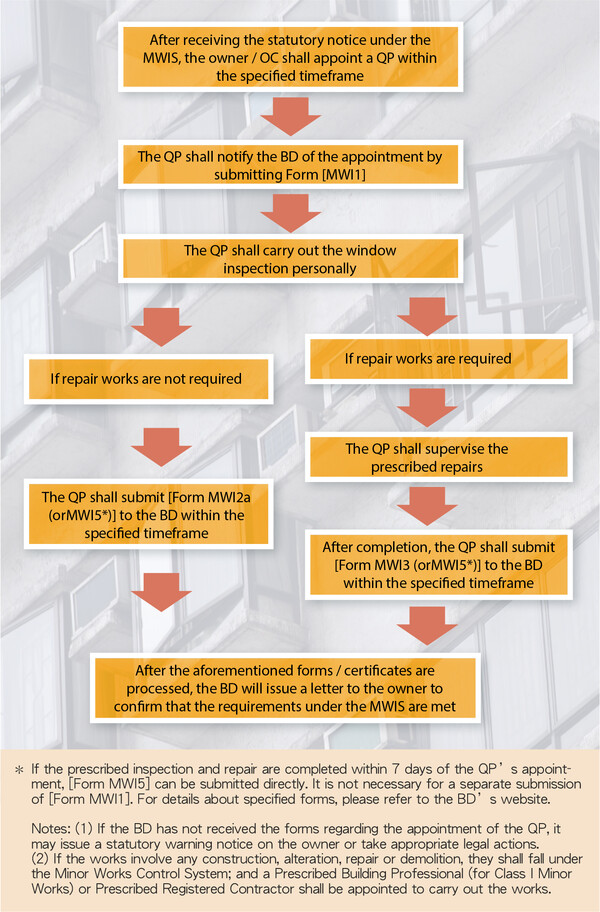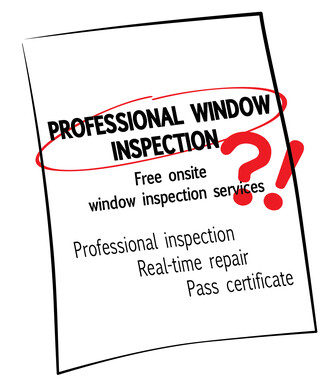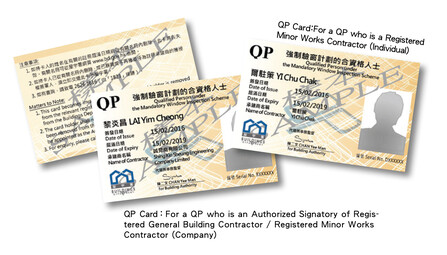Step 1: Know the requirements under the MWIS
To avoid falling into a trap, consumers should first get some basic ideas about mandatory window inspection. In a nutshell, after serving with the statutory notice under the MWIS, the owner / owner's corporation (OC) shall appoint a QP to conduct the prescribed inspection within the specified timeframe, and the QP shall carry out the prescribed window inspection personally, and decide whether repair works are necessary. If repairs are not required, the QP only needs to submit the relevant forms to the BD; if repairs are required, the QP shall supervise the works and then submit the relevant forms to the BD. Finally, the BD will send a letter to the owner to confirm that the requirements under the MWIS are met.

Step 2: Understand the scope of inspection
In a previous complaint received by the Consumer Council (or the ‘Council’), the window inspector claimed that the weather sealants and weather gaskets had aged, and might lead to water seepage and failure in passing the prescribed inspection, and therefore suggested the owner to replace them at additional costs. The complainant later found that weather sealants and weather gaskets were not mandatory inspection items as they did not constitute components that might affect window safety. In fact, what is the scope of prescribed inspection under the MWIS? It mainly covers the following 4 areas:
Glass panes | Broken or cracked? |
Window frames and sashes | Deformed / in jerky motion, or difficult to open and close? |
Hinges | Deformed / corroded? |
Rivets / screws | Loosened, or with greyish white powder or rust? |
After gaining some basic knowledge about the scope, consumers will no longer be easily fooled into including inspection items that are not mandatory under the MWIS. Consumers can decide whether to accept extra works outside the prescribed scope according to their actual needs.
Step 3: Compare the price
In general, consumers may not possess a good enough understanding of aluminum windows. Therefore, it is difficult for them to assess the quality of the materials and parts used and whether the price quotations are reasonable. In view of this, the BD gathers from the market and publishes from time to time cost information for window inspection and repair under the MWIS. Consumers may use this information as reference and get an idea about costs.
In addition, there are companies in the market that offer ‘free window inspection’ to entice business. But normally, as the company that provides window inspection will also prepare the requisite documents, it will typically charge an administrative fee on documentation; even if no repairs are required after the inspection, consumers will still need to pay this fee. If consumers request an inspection purely out of their own concerns about window safety rather than to comply with the MWIS requirements, they should, in order to avoid any misunderstanding, clearly state the purpose of the inspection in advance and see if there is a fee involved with such service, and whether the companies will provide the inspection results in writing.

Step 4: Check the qualifications of the window inspector
In a previous complaint received by the Council, the complainant found that the Registered Contractor (RC) that was engaged for window inspection sent an inspector that was not a QP, indicating that even if a RC was selected, consumers might still stumble upon inspectors with doubtful qualifications. Therefore, consumers should first check the QP list on the BD's website to ensure that the service providers hold the requisite qualifications.
Consumers can also ask the window inspectors to present their QP Cards to identify their qualifications. The QP Card contains the QP's name and recent photo, date of issue and date of expiry (if the QP is a company, the QP cards are issued to its authorized signatories).

Step 5: Protect your interests by having the arrangements in writing
Finally, companies that provide window inspection services should make their contracts and invoices clear, setting out details of the repair works including the type, quantity, and price of the replacement parts, and whether the fees also cover the preparation and submission of the requisite documents. The Council has also noticed that many companies have labeled the inspection documents as ‘Pass Paper" or ‘Certificate’, and would suggest consumers to check their definitions. It should be noted that having a simple paper may not meet the requirements under the MWIS, and the QP must prepare and submit the specified forms. If consumers are not certain whether their engaged QP have submitted the specified forms within the prescribed timeframe, they may ask the QP to provide a copy of the submission as record. They should also ensure the proper keeping of contracts and invoices in case of future disputes.
For details of the MWIS, consumers may refer to the Code of Practice for the Mandatory Building Inspection Scheme and the Mandatory Window Inspection Scheme 2012 on the BD's website (http://www.bd.gov.hk/). For further queries, they can also call the BD’s hotline (2626 1616).
If you want to know more about the complaints regarding window inspection services received by the Council, you may download the article ‘Select Window Inspection Service Carefully Avoid Unnecessary Costs‘ (Chinese version only) in Issue #475 of CHOICE Magazine for free.






![[Baby Snacks Guide] Who Says Snacks Can’t Be Healthy?](/f/guide_detail/415742/376c212/bb%20snack.jpg)




